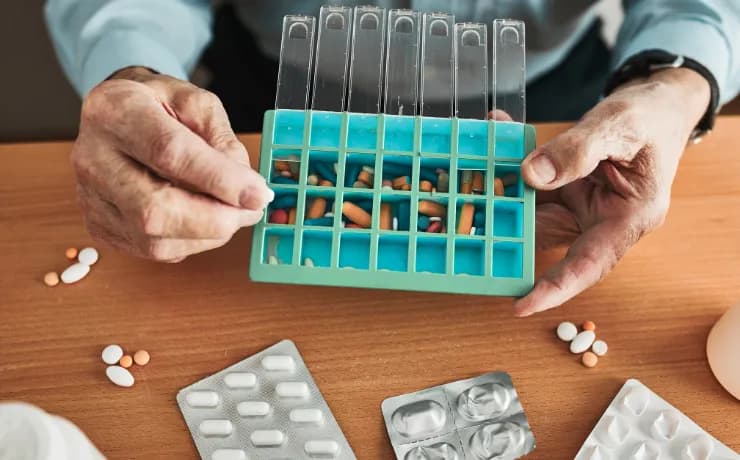Blog
5 Ways Pharmacies Help Patients Stay on Track with Medications

Managing medications isn’t always easy—especially when juggling multiple prescriptions, schedules, or health conditions. Many patients forget doses, stop taking their medications early, or struggle with side effects. That’s where pharmacies step in. Pharmacies play a vital role in helping patients stick to their treatment plans and achieve better health outcomes.
In this post, we'll explore five important ways pharmacies support medication adherence and help patients stay on track.
Why Medication Adherence Matters
Before diving into the how, it's important to understand the why. Medication adherence means taking medications exactly as prescribed—right dose, right time, and for the full duration. When patients don’t follow their medication regimen, it can lead to:
-
Poor treatment results
-
Increased risk of complications
-
More frequent hospital visits
-
Higher healthcare costs
Thankfully, pharmacists are trained to offer tools, services, and support that make it easier for you to manage your medications confidently.
1. Medication Synchronization (Med Sync)
One of the biggest challenges for patients is keeping track of multiple refill dates. With medication synchronization, pharmacies align all your refills so you can pick them up on the same day each month.
How It Helps:
-
Fewer trips to the pharmacy
-
A consistent monthly schedule
-
Easier to remember when to refill
Pharmacy staff can even call or text you when your medications are ready, so you never miss a pickup.
2. Automatic Refill Programs
If you're managing a chronic condition, chances are you need a long-term medication plan. Automatic refill programs are designed to ensure you always have your medications when you need them—without the hassle of calling in.
How It Helps:
-
Prevents running out of medication
-
Saves time and effort
-
Keeps treatment consistent
Many pharmacies also offer home delivery or curbside pickup options, making it even more convenient to stay on track.
3. Personalized Medication Counseling
Understanding how and when to take your medications is crucial. Pharmacists provide one-on-one counseling to help you understand your prescriptions, including:
-
How to take your medications correctly
-
What side effects to expect
-
How medications might interact with foods or other drugs
Why It Matters:
-
Education improves confidence in managing your treatment
-
Better communication helps catch issues early
-
Patients are more likely to stay on track when they understand the purpose of each medication
Never hesitate to ask your pharmacist questions—they are there to help.
4. Medication Packaging Solutions
For patients taking multiple medications, remembering which pill to take and when can be overwhelming. That’s why many pharmacies offer custom medication packaging.
Options Include:
-
Blister packs or pill organizers that group doses by day and time
-
Color-coded packaging for easy identification
-
Clearly labeled containers to reduce confusion
How It Helps:
-
Makes it easier to follow complex medication schedules
-
Reduces the risk of missing or doubling doses
-
Helps caregivers assist loved ones with greater ease
If you're helping a family member with their medications, ask your pharmacist about packaging options.
5. Reminder Tools and Digital Support
In today’s digital age, pharmacies often provide tech-friendly tools to help patients stay consistent with their treatment. These include:
-
Mobile apps that send daily medication reminders
-
Text or call alerts for refills and pickups
-
Online portals where you can view your prescription history
How It Helps:
-
Provides gentle reminders to take your medication
-
Encourages patients to stay accountable
-
Makes managing medication part of your daily routine
Using digital support tools is especially helpful for busy individuals or those with memory challenges.
Bonus: Ongoing Monitoring and Follow-Up
Pharmacies don’t just dispense medications—they also monitor how your treatment is going. Many pharmacists offer follow-up check-ins, especially if you’ve started a new medication or changed your dosage.
What They Look For:
-
Side effects or adverse reactions
-
Challenges with adherence
-
Potential drug interactions
With these regular check-ins, pharmacies act as a safety net to catch and resolve issues early.
Tips for Staying on Track with Medications
While pharmacies offer valuable support, here are a few things you can do to stay on track as well:
-
Keep a medication list in your wallet or phone
-
Use a daily pill box if packaging isn't available
-
Set alarms or reminders on your phone
-
Ask questions if you're unsure about your medications
-
Attend regular check-ins with your healthcare provider
Remember: You’re not alone in managing your health. Pharmacists are part of your care team and ready to support you every step of the way.
Conclusion
Whether it’s syncing your prescriptions, offering personalized counseling, or setting up automatic refills, pharmacies provide powerful tools to help you stick to your medication plan. With the right support, staying on track doesn’t have to be difficult—it can become part of a healthy, manageable routine.
If you're ever feeling overwhelmed or unsure about your medications, talk to your pharmacist. They’re one of your most accessible healthcare allies and are always ready to help.

Request A CallBack
Have a question or need assistance? Request a call back, and one of our friendly team members will reach out to you as soon
